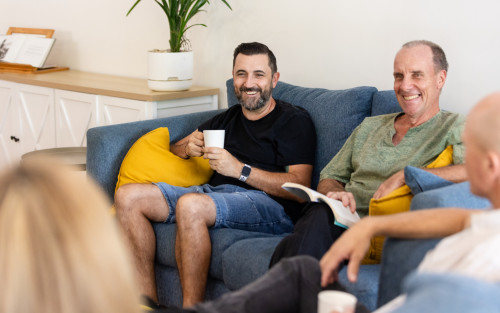


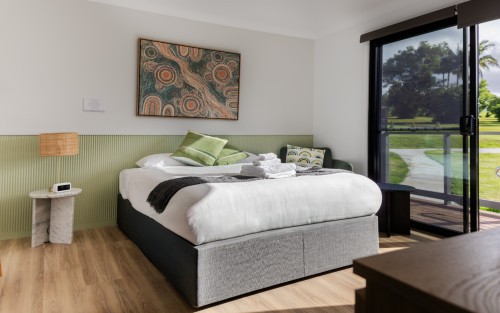
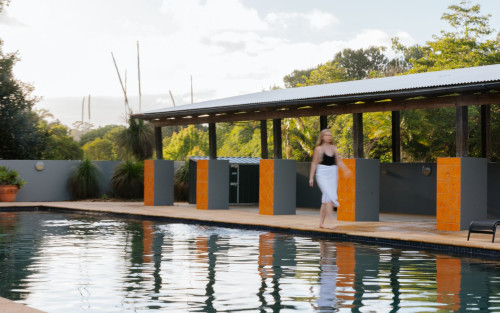




Palladium Private
Verified Center
This provider's information has been quality-checked by Recovery.com's Research Team for accuracy and completeness, including center verification through appropriate third-party organizations.
Treatment Focus
This center treats substance use disorders and mental health conditions. You'll receive individualized care catered to your unique situation and diagnosis, learn practical skills for recovery, and make new connections in a restorative environment.
Primary Level of Care
Offering intensive care with 24/7 monitoring, residential treatment is typically 30 days and can cover multiple levels of care. Length can range from 14 to 90 days typically.
Treatment Focus
This center treats substance use disorders and mental health conditions. You'll receive individualized care catered to your unique situation and diagnosis, learn practical skills for recovery, and make new connections in a restorative environment.
Primary Level of Care
Offering intensive care with 24/7 monitoring, residential treatment is typically 30 days and can cover multiple levels of care. Length can range from 14 to 90 days typically.
Private Pay
You pay directly for treatment out of pocket. This approach can offer enhanced privacy and flexibility, without involving insurance. Exact costs vary based on program and length of stay. Contact the center for specific details.
Palladium Private
Palladium Private
About Palladium Private
Palladium Private's holistic, BioPsychoSocial program approach considers biological, psychological, and social factors, and their complex interactions in understanding and treating mental health disorders and addictive behaviours. Established in 2003, their Sunshine Coast hinterland retreat allows guests to immerse themselves in their recovery, away from localised or environmental stressors and triggers.
Tailored And Evidence-Based
Palladium Private combines evidence-based psychological care with holistic therapies. A multi-disciplinary team of Allied Health professionals, psychologists, psychotherapists and other specialised therapists deliver treatment. Residential treatment varies between 2 to 12 weeks, with stay times determined based on the client’s presentation in the admissions phase. The therapy team uses a combination of evidence-based therapies and techniques, including rational emotive behavior therapy (REBT), cognitive behavioral therapy (CBT), acceptance and commitment therapy (ACT), dialectical behavioral therapy (DBT), NLP, Gestalt Therapy, Neuropsychotherapy, Schema Therapy, Emotion Focused Therapy, Sensorimotor Psychotherapy and more.
Structured, Client-Focused Care
Guests at Palladium Private have 24-hour support from crisis care-trained counsellors, nursing staff, hosts and support workers. One-on-one psychotherapy sessions are held weekly, interspersed with group therapy sessions, workshops, and holistic therapies such as yoga, personal training, art therapy, garden therapy, and guided mindfulness sessions. Guests can also enjoy offsite excursions, nature walks, steam and plunge therapy, massage, improvisation, dance and drumming. Palladium Private welcomes certified support animals at no additional cost.
A Continuum of Care
Each guest will spend one-on-one time with a Duty Manager before leaving treatment to tailor a personalised Aftercare Plan that supports their return home over the following 6 months. The key focus of the Aftercare Plan is to engage with local support upon returning home, so all appointments are made and relationships established.
The Aftercare Plan will be unique to each guest’s specific needs and circumstances. It includes ongoing psychotherapy sessions with their Palladium Private therapist, a pack of customised resources, regular check-ins with their support team, coaching, goals setting, employment support, engagement with local community supports and healthcare professionals, and tailored wellness and mental health-related support to help in the transition home and post-treatment goals.
Palladium Private is a proud member of Sana Health Group, a network of mental health and addiction treatment centres committed to patient excellence. As part of our commitment to providing the highest quality care, Palladium Private and other Sana Health Group facilities adhere to rigorous national accreditation standards set by the Australian Government's National Safety and Quality Health Service (NSQHS). This accreditation is a requirement of all public and private hospitals country-wide, and our initiative to obtain it demonstrates our dedication to evidence-based practices, clinical governance, and continuous improvement, ensuring exceptional patient outcomes.

Highlights from the Center
Highlights
These highlights are provided by and paid for by the center.
Customized Treatment Plans
Holistic Approach
Trauma-Informed Care
20+ Years in Business
Center Overview
Treatment Focus
This center treats substance use disorders and mental health conditions. You'll receive individualized care catered to your unique situation and diagnosis, learn practical skills for recovery, and make new connections in a restorative environment.

Palladium Private
Pricing and Program Length
Estimated Center Costs
The cost listed here (from $10,150 AUD/week), is an estimate of program cost. Center price can vary based on program and length of stay. Contact the center for more information. Recovery.com strives for price transparency so you can make an informed decision.




Our Network of Partner Facilities
Recovery.com Verified Listing
Recovery.com verified that the name, location, contact information and license to operate for this treatment provider are valid and up-to-date.

Accredited by HDAA

Licensed by ASIC

NSQHS Standards
Recovery.com is an independent, third-party mental health resource. Verification does not imply endorsement and does not guarantee the quality of treatment services.
Meet Your Care Team

Kim Weller
General Manager

Andrea Perry
Clinical Director

Dan Gatehouse
Duty Manager & Veteran Support

Paul Francis
Intake Manager
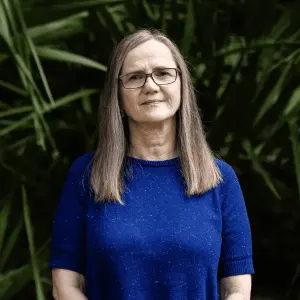
Dr Lisa Jones
Psychologist

Rebekah Bateman
Psychologist
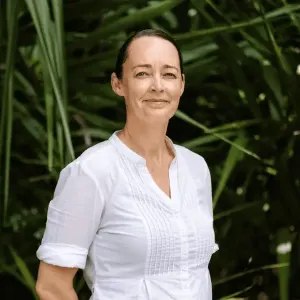
Claire Meraki
Social Worker

Allison Bright
Psychotherapist

Scott McKay
Mental Health Social Worker
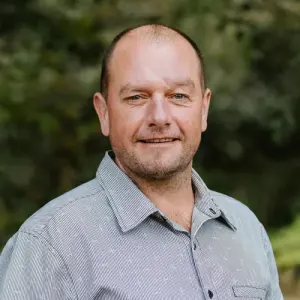
Brad Evans
Intake Consultant
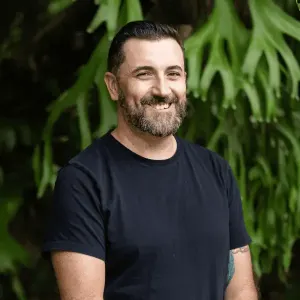
Tim Coulson
Program Facilitator
Your Care Options
Specializations
Alcohol
Using alcohol as a coping mechanism, or drinking excessively throughout the week, signals an alcohol use disorder.
Anxiety
Anxiety is a common mental health condition that can include excessive worry, panic attacks, physical tension, and increased blood pressure.
Co-Occurring Disorders
A person with multiple mental health diagnoses, such as addiction and depression, has co-occurring disorders also called dual diagnosis.
Depression
Symptoms of depression may include fatigue, a sense of numbness, and loss of interest in activities. This condition can range from mild to severe.
Drug Addiction
Drug addiction is the excessive and repetitive use of substances, despite harmful consequences to a person's life, health, and relationships.
Holistic
A non-medicinal, wellness-focused approach that aims to align the mind, body, and spirit for deep and lasting healing.
Post Traumatic Stress Disorder
PTSD is a long-term mental health issue caused by a disturbing event or events. Symptoms include anxiety, dissociation, flashbacks, and intrusive thoughts.
Trauma
Some traumatic events are so disturbing that they cause long-term mental health problems. Those ongoing issues can also be referred to as "trauma."
Who We Treat
Midlife Adults
For adults ages 40+, treatment shifts to focus on the unique challenges, blocks, and risk factors of their age group, and unites peers in a similar community.
Mild Disabilities
Adults with mild physical or intellectual disabilities receive treatment catered to their specific needs in a safe and clinically supportive environment.
Pregnant Women
Addiction and mental health treatment meets the clinical and psychological needs of pregnant women, ensuring they receive optimal care in all areas.
Professionals
Busy, high-ranking professionals get the personalized treatment they need with greater accommodations for work, privacy, and outside communication.
Veterans
Patients who completed active military duty receive specialized treatment focused on trauma, grief, loss, and finding a new work-life balance.
Treatment Services
Detox (on-site with residential)
This is often the first step of addiction treatment. For many people, it's dangerous to detox without proper medical support.
Licensed Primary Mental Health
Some primary care providers offer mental health diagnosis and treatment. This can prevent patients from developing more serious conditions.
Residential
In a residential rehab program, patients live onsite, with access to daily treatment and 24-hour care. An average stay is 30-90 days.
Retreat
These curated experiences promote physical, mental, and spiritual well-being, and provide a break from the busy pace of daily life.
Approaches
Evidence-Based
A combination of scientifically rooted therapies and treatments make up evidence-based care, defined by their measured and proven results.
Holistic
A non-medicinal, wellness-focused approach that aims to align the mind, body, and spirit for deep and lasting healing.
Non 12 Step
Non-12-Step philosophies veer from the spiritual focus of the 12-Steps and instead treat the disease of addiction with holistic or secular modalities.
Personalized Treatment
The specific needs, histories, and conditions of individual patients receive personalized, highly relevant care throughout their recovery journey.
Therapeutic Community
Therapeutic communities allow patients to contribute to the success and progress of their community, through healthy behaviors or even basic chores.
Therapies
1-on-1 Counseling
Patient and therapist meet 1-on-1 to work through difficult emotions and behavioral challenges in a personal, private setting.
Meditation & Mindfulness
A practiced state of mind that brings patients to the present. It allows them to become fully aware of themselves, their feelings, and the present moment.
Rational Emotive Behavior Therapy
A type of cognitive therapy that identifies negative self-defeating thoughts and behaviors, rewriting beliefs to be positive, empowering, and present.
Mindfulness Therapy
This ancient practice can be mental, emotional, and even spiritual. In meditation, you focus your attention on the present moment without judgement.
Attachment-Based Family Therapy
ABFT is a trauma-focused therapy that teaches you to form healthy relationships by rebuilding trust and healing attachment issues formed in childhood.
Art Therapy
Visual art invites patients to examine the emotions within their work, focusing on the process of creativity and its gentle therapeutic power.
Experiential Therapy
With this approach, patients heal by doing. Therapists help patients process difficult emotions to speak, using guided activities like art or dance.
Expressive Arts
Creative processes like art, writing, or dance use inner creative desires to help boost confidence, emotional growth, and initiate change.
Conditions We Treat
Pornography Addiction
A person with a porn addiction is emotionally dependent on pornography to the point that it interferes with their daily life and relationships.
Personality Disorders
Personality disorders destabilize the way a person thinks, feels, and behaves. If untreated, they can undermine relationships and lead to severe distress.
ADHD, ADD
ADHD is a common mental health condition caused by dopamine imbalance. Common symptoms include inattention, hyperactivitiy, and impulsivity.
Anxiety
Anxiety is a common mental health condition that can include excessive worry, panic attacks, physical tension, and increased blood pressure.
Bipolar
This mental health condition is characterized by extreme mood swings between depression, mania, and remission.
Codependency
Codependency is a pattern of emotional dependence and controlling behavior. It's most common among people with addicted loved ones.
Depression
Symptoms of depression may include fatigue, a sense of numbness, and loss of interest in activities. This condition can range from mild to severe.
Gambling
Excessive, repetitive gambling causes financial and interpersonal problems. This addiction can interfere with work, friendships, and familial relationships.
Gaming
Compulsive gaming is most often a problem for children and teens. The disorder can affect physical health, sleep, and the ability to focus at school.
Substances We Treat
Alcohol
Using alcohol as a coping mechanism, or drinking excessively throughout the week, signals an alcohol use disorder.
Benzodiazepines
Benzodiazepines are prescribed to treat anxiety and sleep issues. They are highly habit forming, and their abuse can cause mood changes and poor judgement.
Co-Occurring Disorders
A person with multiple mental health diagnoses, such as addiction and depression, has co-occurring disorders also called dual diagnosis.
Cocaine
Cocaine is a stimulant with euphoric effects. Agitation, muscle ticks, psychosis, and heart issues are common symptoms of cocaine abuse.
Drug Addiction
Drug addiction is the excessive and repetitive use of substances, despite harmful consequences to a person's life, health, and relationships.
Methamphetamine
Methamphetamine, or meth, increases energy, agitation, and paranoia. Long-term use can result in severe physical and mental health issues.
Opioids
Opioids produce pain-relief and euphoria, which can lead to addiction. This class of drugs includes prescribed medication and the illegal drug heroin.
Prescription Drugs
It's possible to abuse any drug, even prescribed ones. If you crave a medication, or regularly take it more than directed, you may have an addiction.
Languages
Aftercare
Care Designed for Your Needs
Personal Amenities
Amenities
Special Considerations
Activities
Off-Site Activities
Yoga
Yoga is both a physical and spiritual practice. It includes a flow of movement, breathing techniques, and meditation.
Off-Site Amenities

Learn More About the Center
Success Stories
Read success stories from Palladium Private’s alumni.
FAQs for Palladium Private
Palladium Private answers common questions about their program, staff, and location.
Program Costs and Potential Funding Options
See what’s included in treatment costs and discover the potential funding options available to cover fees.
Aftercare And Recovery
Palladium Private describes how and why aftercare is so important to recovery.
What people are saying
Treatment
4.5
Accommodations
4.4
Food & Nutrition
4.6
Value
4.4
Pros
- Beautiful Location (7)
- Addressed Trauma (7)
- Treated With Respect (7)
- Excellent & Effective Treatment Programming (6)
Cons
- Poor Internet Connection (3)
Jess
Treatment in 2025 • (45 days) • Reviewed 07/14/25
Former Client
•Registered nurse
•Victoria
R
Treatment in 2024 • (21 days) • Reviewed 11/29/24
Former Client
•Business Development
Palladium Private
Anonymous
Treatment in 2025 • (30 days) • Reviewed 03/14/25
Former Client
Palladium Private
V
Treatment in 2025 • (28 days) • Reviewed 01/23/25
Former Client
•Ipswich
Palladium Private
RT
Treatment in 2024 • (30 days) • Reviewed 11/15/24
Former Client
•Canberra
Palladium Private





